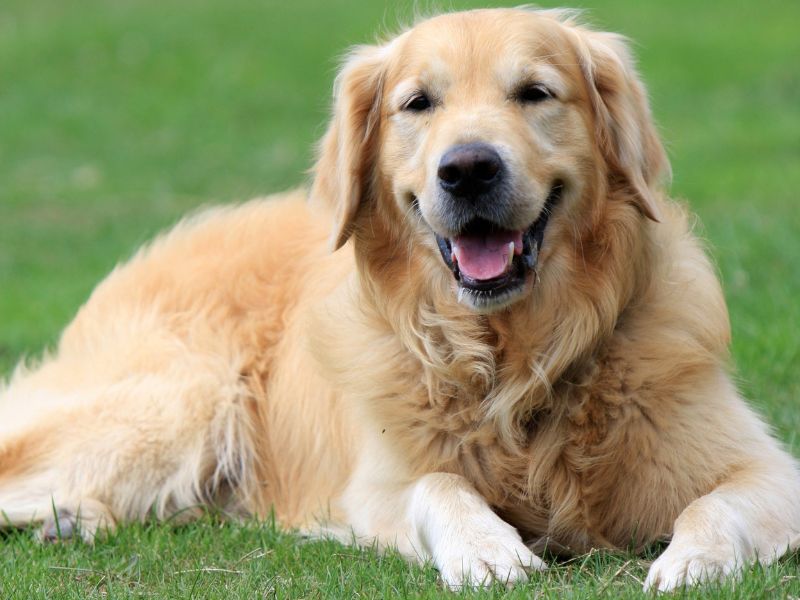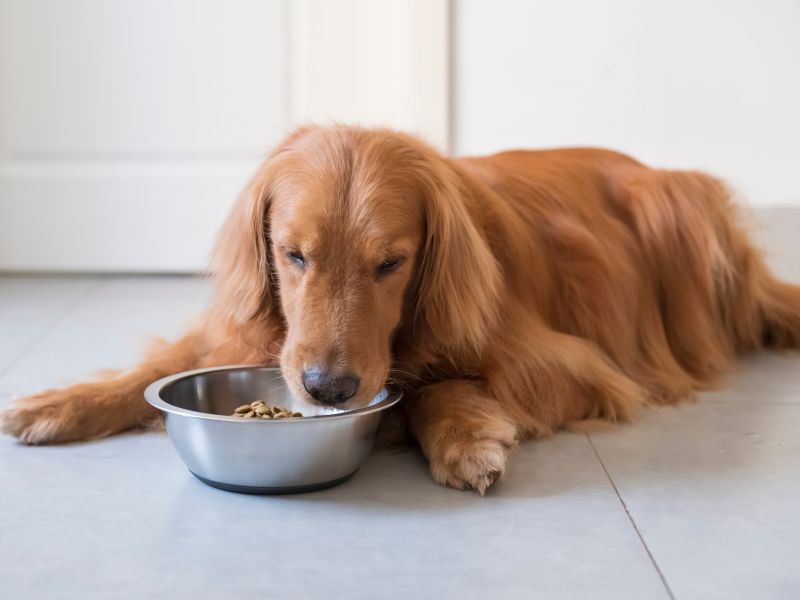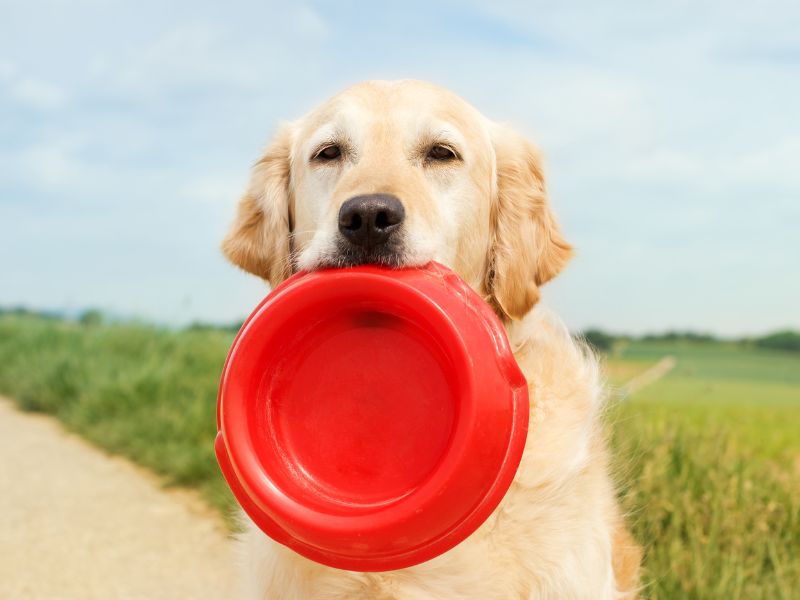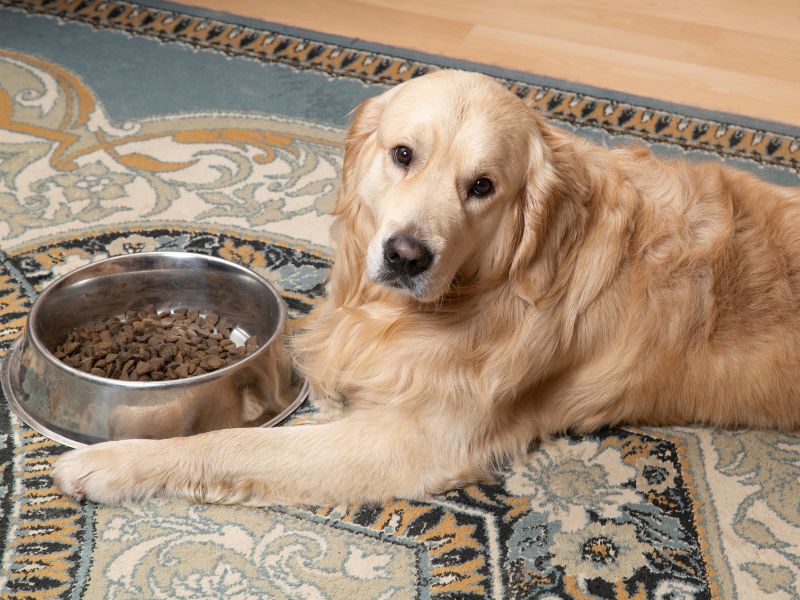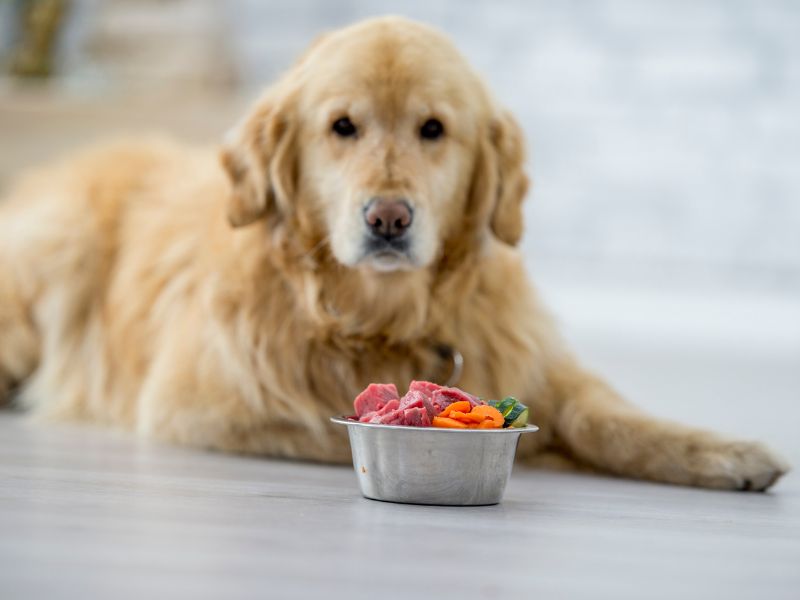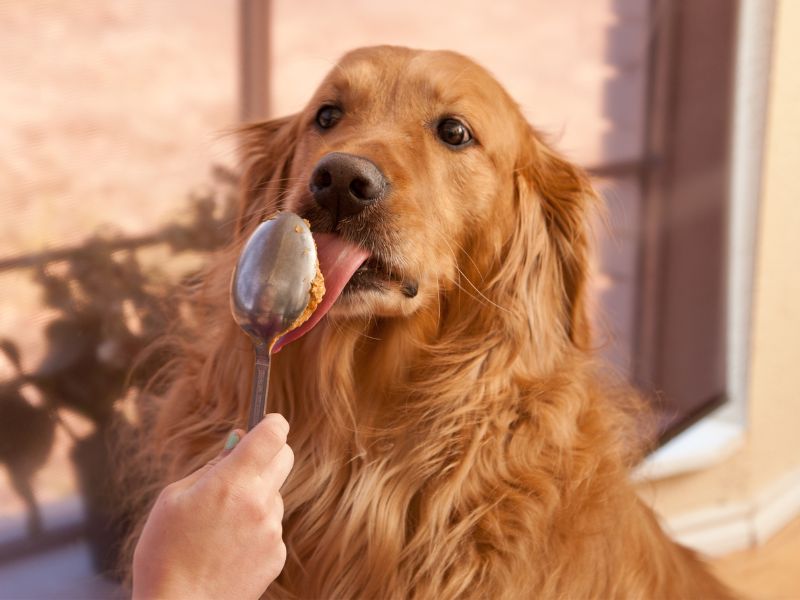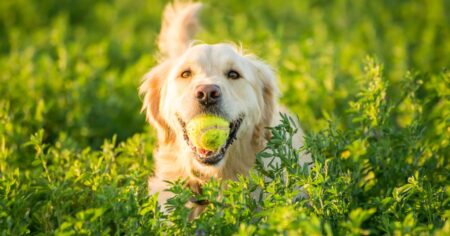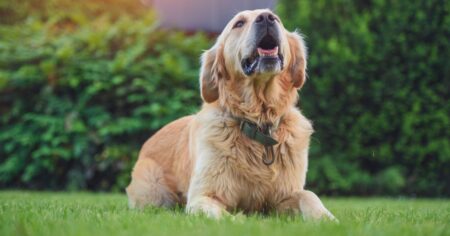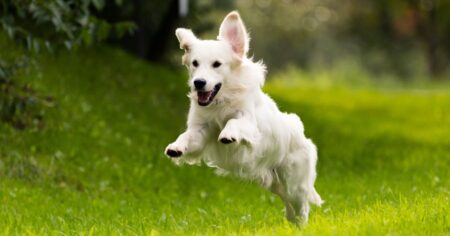Golden retrievers are one of the most popular dog breeds, known for their friendly and loyal temperament. As adult golden retrievers age, their nutritional needs change, and it becomes important to provide them with a high-quality diet that meets their specific requirements. Adult golden retriever food is specially formulated to provide the necessary nutrients to maintain their health and wellbeing.
When selecting adult golden retriever food, it is important to consider their age, weight, and activity level. The food should contain a balanced ratio of protein, fat, and carbohydrates to support their energy needs. Additionally, golden retrievers are prone to certain health issues such as hip dysplasia and obesity, and the food should be tailored to address these concerns.
Feeding adult golden retrievers a high-quality diet has many benefits, including maintaining a healthy coat, joint health, heart health, and healthy skin. It can also reduce the risk of allergies and certain types of cancer. With so many options available, it can be overwhelming to choose the best food for your furry friend. However, with the right knowledge and guidance, selecting the right adult golden retriever food can help ensure a long and happy life for your beloved pet.
Why You Should Feed Your Golden Retriever A High-Quality Food
Feeding a high-quality diet to your adult Golden Retriever is important for their overall health and well-being. Here are some reasons why:
- Heart health: A high-quality diet can help maintain a healthy heart in your Golden Retriever. Look for foods that are low in sodium and high in omega-3 fatty acids, which can help reduce the risk of heart disease.
- Healthy skin: A diet rich in essential fatty acids and antioxidants can help maintain healthy skin and a shiny coat in your Golden Retriever.
- Fewer allergies: Some dogs can be allergic to certain ingredients in their food. Feeding a high-quality diet with limited ingredients can help reduce the risk of food allergies in your Golden Retriever.
- Healthy digestive system: A diet that is easily digestible and contains a good balance of fiber can help maintain a healthy digestive system in your Golden Retriever.
When choosing a high-quality food for your adult Golden Retriever, look for foods that contain high-quality protein sources, such as chicken, fish, or lamb. Avoid foods that contain fillers, by-products, or artificial preservatives. It is also important to feed your Golden Retriever the appropriate amount of food based on their age, weight, and activity level.
Remember, feeding your adult Golden Retriever a high-quality diet is one of the few things you have control over in regards to their health. By providing them with the proper nutrition, you can help ensure they live a long and healthy life.
How Do You Choose A High-Quality Food For Your Golden Retriever?
Choosing the right food for your adult golden retriever can be a daunting task, but it is crucial to their health and well-being. Here are a few things to consider when selecting a high-quality food:
Look for a Complete and Balanced Formula
A complete and balanced formula should contain all the necessary nutrients, vitamins, and minerals that your golden retriever needs to thrive. This includes protein, fat, carbohydrates, fiber, vitamins, and minerals. Make sure to read the ingredient label and check that the food meets the Association of American Feed Control Officials (AAFCO) standards.
Consider Your Golden Retriever’s Age and Health Needs
As your golden retriever ages, their nutritional needs change. For example, a senior dog may require fewer calories and more joint support. Additionally, if your dog has any health issues, such as allergies or sensitivities, you may need to choose a specialized formula that meets their unique needs.
Check the Ingredient List
The ingredient list can tell you a lot about the quality of the food. Look for whole food ingredients such as chicken, beef, or fish. Avoid foods that contain by-products, fillers, or artificial preservatives, colors, or flavors.
Read Reviews and Ask for Recommendations
Reading reviews and asking for recommendations from other golden retriever owners or your veterinarian can be helpful. They can provide valuable insights into the quality and effectiveness of different brands and formulas.
By keeping these factors in mind, you can choose a high-quality food that meets your golden retriever’s nutritional needs and supports their overall health and well-being.
What Makes Food High-Quality

High-quality food is essential for the overall health and well-being of adult Golden Retrievers. Here are some factors that make food high-quality:
1. Balanced Nutrition
A high-quality dog food should provide balanced nutrition that includes the right amount of protein, carbohydrates, fats, vitamins, and minerals. Golden Retrievers require a diet that is high in protein to maintain their muscle mass and support their active lifestyle. The food should also contain essential fatty acids to promote healthy skin and coat.
2. Whole Food Ingredients
The best dog food for adult Golden Retrievers should contain whole food ingredients that are sourced from high-quality suppliers. Whole food ingredients are minimally processed and retain their natural nutrients, which are essential for the health of the dog. Examples of whole food ingredients include deboned chicken, brown rice, barley, peas, and oats.
3. No Artificial Additives
High-quality dog food should not contain any artificial additives such as preservatives, colors, or flavors. These additives can cause health problems in dogs and reduce the nutritional value of the food. The best dog food for adult Golden Retrievers should be free from artificial additives and should contain only natural ingredients.
4. Digestibility
The food should be easily digestible to ensure that the dog can absorb all the essential nutrients from the food. A high-quality dog food should contain easily digestible proteins such as chicken, lamb, or fish. It should also contain prebiotics and probiotics to promote healthy digestion and a strong immune system.
In summary, high-quality food for adult Golden Retrievers should provide balanced nutrition, whole food ingredients, no artificial additives, and be easily digestible. By choosing the right food, pet owners can ensure that their furry friends enjoy good health and a long life.
Golden Retriever Health Issues That Can Be Food-Related
Golden Retrievers are generally healthy dogs, but certain health issues can arise due to poor diet choices. Here are some common health issues that can be food-related:
Obesity
Obesity is a common problem among Golden Retrievers, and it can lead to various health issues such as joint problems, heart disease, and diabetes. Feeding your dog too much or providing them with unhealthy treats can lead to weight gain. It is important to choose a high-quality dog food that is appropriate for their age, size, and activity level.
Allergies
Some Golden Retrievers can develop food allergies that can cause skin irritation, itching, and digestive problems. Common allergens include beef, chicken, dairy, wheat, and soy. If your dog is experiencing any symptoms of food allergies, consult with a veterinarian to determine the underlying cause and find an appropriate diet.
Dental Problems
Poor quality dog food can lead to dental problems such as gum disease and tooth decay. Feeding your dog a diet that is high in sugar and carbohydrates can lead to plaque buildup and tartar formation. Choosing a high-quality dog food that is designed to promote dental health can help prevent these issues.
Digestive Issues
Feeding your Golden Retriever a diet that is high in fat or low in fiber can lead to digestive problems such as diarrhea, constipation, and vomiting. Choosing a high-quality dog food that is designed to promote digestive health can help prevent these issues.
To ensure the health and wellbeing of your Golden Retriever, it is important to choose a high-quality dog food that is appropriate for their age, size, and activity level. By providing them with a healthy diet, you can help prevent common health issues and ensure that they live a long and happy life.
How Much To Feed Your Adult Golden Retriever
Feeding an adult Golden Retriever the right amount of food is crucial to maintaining their overall health and well-being. As a general rule of thumb, an adult Golden Retriever should eat around two to six cups of food per day, depending on their weight, activity level, and overall health.
It’s important to note that not all dog foods are created equal, and some may require different serving sizes. It’s best to consult with a veterinarian or do your own research to determine the appropriate serving size for your adult Golden Retriever.
When selecting a dog food for your adult Golden Retriever, it’s important to choose a high-quality brand that is specifically formulated for their nutritional needs. Look for a dog food that contains high-quality protein sources, such as chicken or beef, and is free from fillers, artificial preservatives, and by-products.
In addition to feeding your adult Golden Retriever the appropriate amount of food, it’s also important to monitor their weight and adjust their serving size as needed. Overfeeding can lead to obesity, which can cause a variety of health problems, including joint pain, diabetes, and heart disease.
Overall, feeding your adult Golden Retriever a healthy, balanced diet is key to ensuring they live a long, happy life. By following the guidelines above and consulting with a veterinarian when needed, you can ensure your furry friend is getting the nutrition they need to thrive.
The Dangers Of BEG And Grain-Free Diets
Many pet owners have been switching to boutique, exotic ingredient, and grain-free (BEG) diets for their dogs, including adult Golden Retrievers. However, recent studies have linked BEG diets to a higher risk of canine heart disease, specifically dilated cardiomyopathy (DCM) [1]. The FDA has also released a warning about the potential dangers of feeding dogs BEG diets [1].
One of the main issues with BEG diets is that they often contain a high amount of peas, lentils, and other legume seeds as a substitute for grains. These ingredients can lead to a deficiency in taurine, an amino acid that is essential for a dog’s heart health [2]. Taurine deficiency has been linked to DCM in dogs [2].
Additionally, many BEG diets are made by small companies that do not have the same level of quality control as larger companies. This can lead to inconsistencies in the formulation and nutritional content of the food. As a result, dogs may not be getting the proper nutrients they need to maintain good health [3].
It is important to consult with a veterinarian before making any changes to a dog’s diet, including switching to a BEG or grain-free diet. A vet can help determine if a particular diet is appropriate for a dog’s individual needs and can recommend alternative options if necessary.
Overall, while BEG diets may seem like a trendy and healthy option for adult Golden Retrievers, the potential risks and dangers associated with these diets should not be ignored. Pet owners should prioritize their dog’s health and well-being by choosing a diet that is backed by scientific research and recommended by a veterinarian.
References
[1] FDA Grain-Free Diet Alert: What Dog Owners Need to Know. https://www.akc.org/expert-advice/nutrition/fda-grain-free-diet-alert-dcm/
[2] Is Grain-Free Dog Food Bad? https://www.akc.org/expert-advice/nutrition/grain-free-dog-food-bad-or-good/
[3] Should you feed your pet grain-free food? https://humanesocietyhbg.org/2021/05/05/should-you-feed-your-pet-grain-free-food/
What About Feeding Your Golden Retriever A Raw Diet Or Homemade Food?
Feeding a raw diet or homemade food to a Golden Retriever can be a great way to ensure that they are getting all the nutrients they need. However, it is important to do your research and ensure that you are providing a balanced diet that meets all of their nutritional needs.
Raw diets, also known as BARF (Biologically Appropriate Raw Food) diets, consist of raw meat, bones, and organs. Proponents of raw diets claim that they provide numerous health benefits, including healthier skin and coat, improved digestion, and reduced risk of certain diseases. However, it is important to note that raw diets can be difficult to balance properly and can pose a risk of bacterial contamination if not handled properly.
Homemade food can also be a great option for Golden Retrievers, as it allows you to control exactly what your dog is eating. However, it is important to ensure that the diet is balanced and meets all of your dog’s nutritional needs. Homemade diets should include a variety of protein sources, as well as vegetables and grains. It may be helpful to consult with a veterinarian or canine nutritionist to ensure that your homemade diet is properly balanced.
Ultimately, whether you choose to feed your Golden Retriever a raw diet or homemade food is a personal decision that should be made based on your dog’s individual needs and preferences. It is important to do your research and consult with a professional to ensure that your dog is receiving a balanced and nutritious diet.
What We Feed Our Golden
Many dog owners struggle with finding the right food for their furry friends, but for the owners of adult Golden Retrievers, it can be especially challenging. The right food is essential to keep your Golden Retriever healthy and happy.
When it comes to feeding their adult Golden Retriever, many owners prefer to stick with high-quality dog food brands that contain natural and wholesome ingredients. Some of the popular dog food brands for Golden Retrievers include Purina Pro Plan, Blue Buffalo, and Wellness Complete Health. These brands offer a range of dog food options for different life stages and dietary needs.
In addition to commercial dog food, many owners also supplement their Golden Retriever’s diet with homemade meals. This can include lean meats, such as chicken and turkey, cooked vegetables, and rice or pasta. It is important to avoid feeding your Golden Retriever foods that are toxic to dogs, such as chocolate, onions, and grapes.
When it comes to portion sizes, it is important to follow the feeding guidelines provided by the dog food brand. Overfeeding your Golden Retriever can lead to weight gain and other health problems. On the other hand, underfeeding can lead to malnourishment and other health issues.
Overall, feeding an adult Golden Retriever requires careful consideration and attention to their dietary needs. By providing them with high-quality dog food and supplementing their diet with healthy homemade meals, you can ensure that your Golden Retriever stays healthy and happy for years to come.
How To Switch Your Golden Retriever’s Food
Switching your Golden Retriever’s food can be a daunting task, but with a little planning and patience, it can be done smoothly. Here are a few tips to make the transition easier for your furry friend:
- Gradual transition: Start by mixing the old food and a small amount of new food, then adding more new food each day. This gradual transition will help your dog’s digestive system adjust to the new food and prevent any stomach upsets.
- Monitor your dog’s weight: Keep in mind that it is healthier for your golden retriever puppy to be a little bit thin than a little bit chunky. Start on the low end of the range and increase if your puppy starts to look thin.
- Choose the right food: To choose the best dog food for your adult golden retriever, talk to your vet, do your own research about the brands and the ingredients, talk with your breeder or other golden retriever owners, and see what your dog likes. Make sure the new food meets your dog’s nutritional needs and is appropriate for their age, weight, and activity level.
- Be patient: It may take a few weeks for your dog to adjust to the new food. Be patient and monitor their appetite, stools, and overall health during the transition period. If you notice any unusual symptoms, consult your vet.
By following these tips, you can make the switch to adult food a smooth and stress-free process for your Golden Retriever.
Conclusion
In conclusion, feeding a high-quality diet to adult Golden Retrievers is crucial for maintaining their health and longevity. It is important to choose a food that is specifically formulated for their breed and age, and to avoid foods that may be harmful to their health.
When selecting a food, it is recommended to look for ingredients such as whole meats, fruits, and vegetables, and to avoid foods that contain fillers, by-products, and artificial preservatives. Additionally, it is important to feed adult Golden Retrievers the appropriate amount of food based on their weight and activity level, as overfeeding can lead to obesity and other health problems.
Overall, by choosing the right food and feeding the appropriate amount, adult Golden Retrievers can enjoy a healthy and happy life with their owners.


